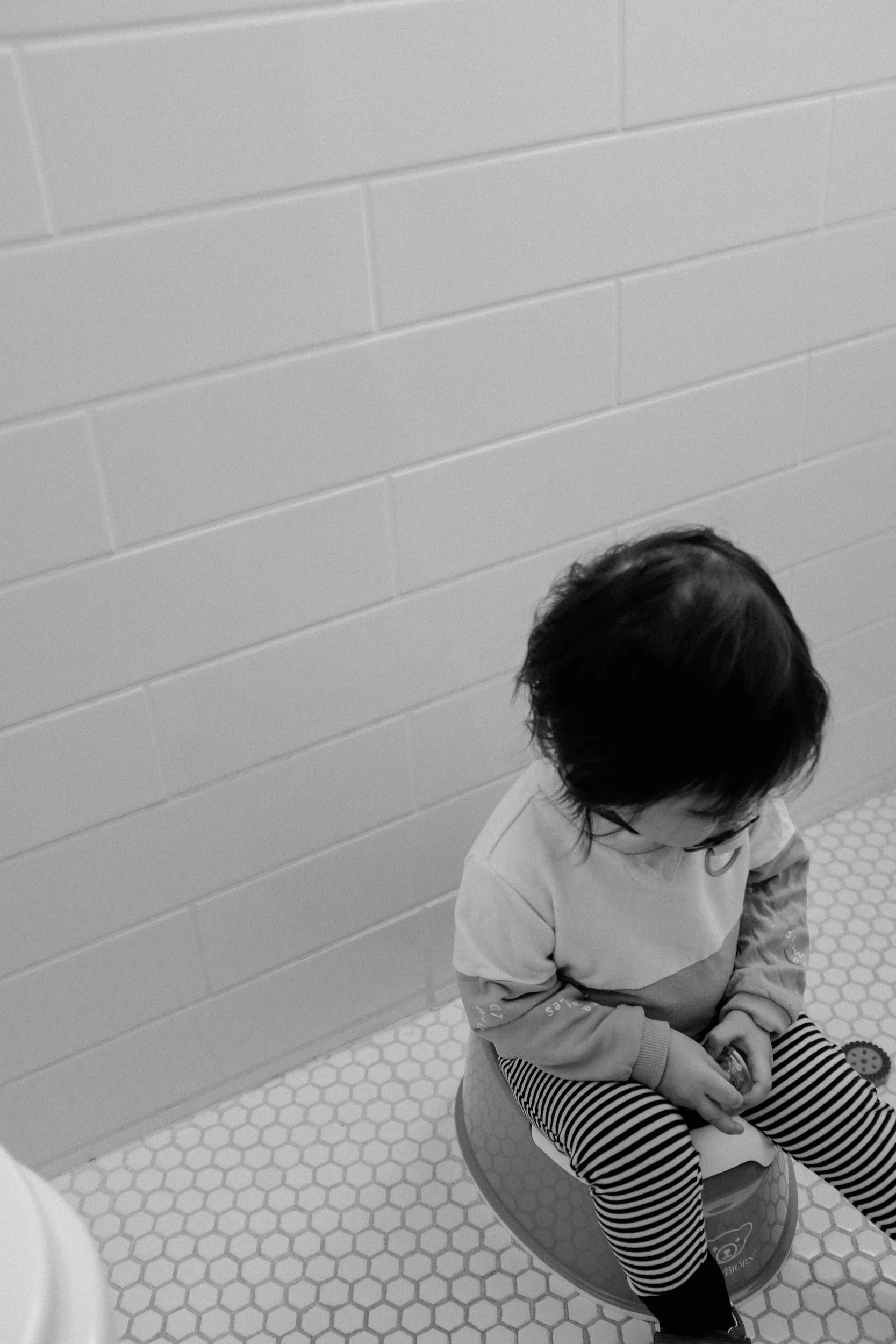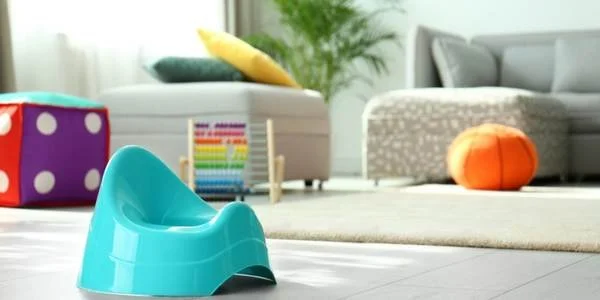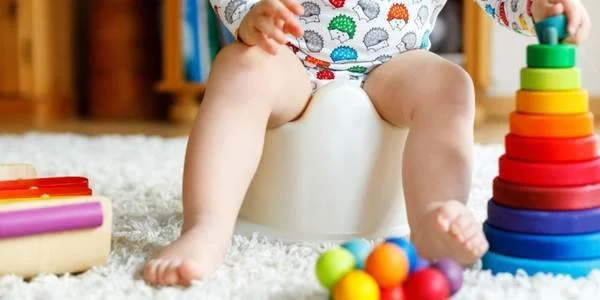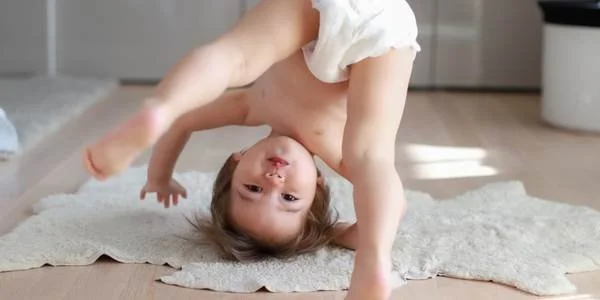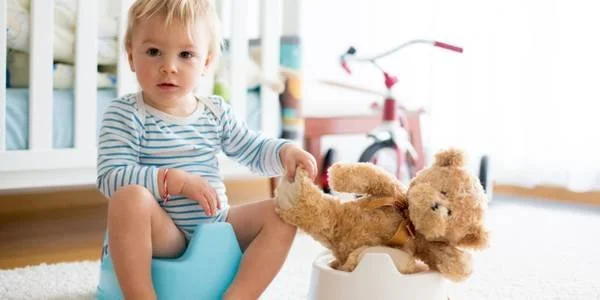How to potty train your child [+ Overcome Challenges]
So many parents feel like they should make the most of being at home by introducing the idea of potty training – especially if they feel like their child is showing some signs.
When should I start to Potty Train?
There is no one size fits all when it comes to potty training your child. When children decide that they want to use the toilet, they will use it. Some children are ready much sooner than others but rest assured, your child will want to sit on the potty when the time is right.
Whilst you can't force your child to use the toilet, you can encourage toilet training from the age of 3. However, if your child shows signs prior to that, take the lead.
It's important to look for the signs of readiness, some children can be 3.5 years and older but I recommend having 3 years as a goal.
I recently ran a poll on my Instagram @ParentSupport to see when other parents started toilet training, these results varied so much from some starting as young as 2 years, to 4 years when they finally achieved dry pants.
Sign up to the Preparing to Toilet Train Workshop on June 23rd
Here is a snippet from Weekend AM on Virgin Media Television where I give insight in to my Potty training techniques
Timing is key
Most parents have read all the books, blogs, and social media posts there are, in hope of understanding how to start potty training their children, but the truth is that timing really is key here.
You as a parent or caregiver need to be ready, and so does your child. When you are both ready it makes the transition from nappies into training pants much easier and gives your little one the confidence that they can do it.
Is my child ready for Potty Training?
What are the signs that your child is ready to be potty trained?
Whether the start of potty training comes sooner or later for your child, you will get some telltale signs when it's time for your child to start potty training.
If your child shows a number of these signs, it's a good indication that they're ready for potty training:
Pulling at a wet or dirty nappy
Showing interest in others' use of the toilet, or copying their behaviour
The ability to stay dry for longer than usual
Telling you that they need to use the toilet or have just gone in their nappy
Sometimes hiding when they need the toilet
Some other behavioural signs to look out for are
Are they talking about wees and poos?
Can they follow an instruction?
Are they commenting on their nappy being wet or soiled?
Are they taking interest in siblings going?
Are they holding themselves or jiggling up and down to avoid going?
Can they sit for short periods without distraction?
Every Child Is Different
Children that are relaxed will learn how to use the toilet much better when they are relaxed.
Every child is different and will develop bladder control at different stages. If your child has a speech delay but can understand and follow simple instructions, then consider using the support of visuals such as flash cards from twinkl.ie to help guide the process.
If your child seems ready but you are going through some changes in the family such as a house move, holiday, or a new sibling you should avoid potty training until after this time. Children that are relaxed will learn how to use the toilet much better when they are relaxed.
When teaching your little one how to toilet train, remember to use plenty of positive reinforcement. Keep an eye out for the cues that they need to use the toilet and remember to be patient.
As parents or caregivers, we can put a lot of unnecessary stress on ourselves by trying to get our children to hit milestones when they're not ready. Remember - you know your child best and they will be physically ready to use the potty in time.
The less pressure you put on yourself and your child the better.
As parents or caregivers, we can put a lot of pressure on ourselves by saying 'my eldest was trained at two and a half and my three-year-old is showing no signs – is this normal?'
Remember to trust your gut, you know your own child best! The less pressure you put on yourself and your child the better.
It is so important to remember that every child is different, these are just some guidelines, you do not need to tick them all.
Here are my top Potty Training Tips
Potty training should be child-led
It doesn't matter if your child is 18 months or four years old, encourage potty training when your child is ready. Try not to rush the process because other children in your child's nursery are starting. Every child is unique and will potty train when they are ready.
Let your child choose their potty
When your child is showing that they're ready to start using the potty, get them involved in choosing which one they want. This can give them a sense of empowerment and make them feel in control of their potty seat.
Don't be surprised if your little one thinks it's a toy or game at first. You can help your child understand by sitting their teddy bear on it. This is more so when your child is younger.
Place the potty chair in a convenient location
The toilet is the most obvious location to place your potty, but if there isn't one close by you should consider keeping it close to where your child spends most of their day. The more you can encourage good bathroom habits in the early days, the better.
Reward potty training success
Try using a sticker chart to reward success, you can hang it up near the potty and when they use the potty chair, let them place a sticker on the chart.
Plan the time to potty train
If your child is showing all the signs that they are ready to start toilet training then you should plan the time for it.
Remember, your child might not get it on the first attempt. For some children they could master the art of sitting on the toilet within a week, for others, it might take a few weeks or months. After all, it's a new skill they are learning.
Here are more results from the Potty Training Poll from the Parent Support Community - when I asked how long does it take to Potty Train your Child?
The results that came through varied so much - this tells us again why each and every child is different in their journey - the results were from four to five days to several months with a number having to park it and on the 3rd attempt, they mastered it in 3-4 days.
What should I do if I need to leave the house?
If you need to leave the house whilst you're potty training, bring a few changes of clothes in case of any accidents. Remember to reinforce the importance of them using the potty and ensure you bring it out with you so that they can practice good habits.
As tempting as it can be to allow your little one to wear disposable training pants or pull-ups when leaving the house, this only confuses them. Your child needs to see and feel that you are confident in their ability to manage and practice using the toilet outside of the home.
What should my child wear?
Once your child starts to potty train they should be wearing underwear all day, even when you are away from the house.
Some children will train day and night simultaneously so if this is the case, have underwear on at night with a waterproof mattress protector.
Most children aren't ready to go the full night without a nappy, so training pants are convenient for most parents. If you are wondering whether your child is ready for night training a good indicator is 7 consecutive mornings of a dry nappy.
Potty Training Challenges
Back to Square One?!
As we support our children through their big achievement of staying dry – everyone is happy! However, what happens when suddenly, they regress, whether it is wetting or soiling? This can be both disheartening and stressful for both the child and the parent.
Regression
Regression is a common part of the potty training journey. While it can feel disheartening when your child starts to wet or soil their pants, you need to persevere and stay positive.
If your child is wetting a lot, ask yourself why. If it's the case that they are wetting a lot then review your approach - it's completely fine to put them back in pull-ups for a few weeks if they are wetting excessively.
There is no right or wrong answer here - if your child has been trained quite young, accidents are expected but if it's constant, avoid fighting with yourself about it, we managed to train our daughter after our third attempt!
If your child has been potty trained for some time and is regularly experiencing problems, you should talk with your child's doctor to rule out any potential issues.
Fear of pooing
Fear of pooing in the toilet is much more common than you'd think and sometimes it is related to constipation.. When your child struggles to pass a stool, your child may resist.
Children tend to respond well when they are relaxed, so try some positive reinforcement and reassurance that it will feel better once they have gone.
If your child is regularly constipated, consider looking at their diet and adapting it to contain more fibre. If you are concerned, talk to your GP, public health nurse or dietician
On the other hand, if your child is 4+ and often resists going to the toilet they can experience a condition called ‘encopresis’ which is another word for extreme constipation.
This can happen after your child has successfully toilet trained and is the result of a child resisting to poo causing a build-up and as a result, an impacted bowel that leaks. Unfortunately, this is something your child will have no control over.
Other symptoms can be loss of appetite or pains in their stomach. This can be upsetting for everyone but can be overcome in a very positive way, if you have concerns, contact your GP for advice and support.
Extreme constipation
On the other hand, if you believe it is something more than just behaviour, attention or fear and your child is 4+ often they can experience a condition called ‘encopresis’ which is another word for extreme constipation. This can happen after your child has successfully toilet trained however if they are resisting to poo, it can build up and as a result, the bowel is impacted and instantaneously poo leaks which the child has no control over. Other symptoms can be loss of appetite or pains in their stomach. This can be upsetting for everyone but can be overcome in a very positive way, if you have concerns, contact your GP for advice and support.
Be calm & positive
If you’ve just had a few accidents - try not to feed into it - stay positive and remind them ‘we keep our pants dry and we use the potty."
The child needs to see that the adult is calm and positive - remember it is a new skill they are learning. The less negative attention you pay the better.
Sign up to the Preparing to Toilet Train Workshop on 23rd June
Common Potty Training Questions
Is there a difference between day and nighttime training?
Daytime training is typically mastered first, night training follows suit - but in time. This can happen simultaneously for some children but for the most part - 7 consecutive mornings with a dry nappy is a good sign. In a recent poll, I asked parents if they tried day and night training together - 18% of parents said they did and 82% said they didn’t.
How can I potty train twins?
Tandem training twins has its challenges, but each sibling can be a positive influence on the other. If they are both showing that they are ready, there is no reason why you can't train together. However, you should treat each child as an individual - one child may be ready sooner than the other, and one child may master it quickly whilst the other may struggle. Remember, each child is different and that includes your twins.
Are there any differences in training techniques for girls or boys?
Potty training is hard, regardless of your child's gender and while boys and girls use the potty differently, there's no different training technique for either. The only thing is that parents feel under pressure to have the boys standing to pee! Top tip; follow his lead, he may sit for the first year or longer, there’s no rush. He’ll stand when the time is right.
Should you offer extra fluids during toilet training to help them urinate more?
No - unless your child is poorly or has a temperature, you can continue to give them their recommended daily allowance of fluids. You may find that your child will often visit the toilet in the early days as they experience the sensation to go but may only have a dribble! It’s all part of the process.
When should you delay potty training?
Big changes in your child's life can cause disruptions to potty training. If you are expecting a baby, moving house, taking a holiday or moving rooms these can all have a negative effect on your little one's ability to potty train so consider delaying it until things are more settled.
How can I teach proper hygiene whilst potty training?
Along with wiping and flushing, proper hand hygiene should be instilled from day 1. Even if children resist or forget, persevere! It's recommended that we wash our hands with warm running water and soap for at least 20 seconds. Try to make hand washing more fun by using colourful soaps and singing a song whilst doing it so your child knows how long to wash for.
Potty Training Props
There are a number of ways you can help your child prepare and motivate them for this big transition.
Potty training books - there are lots of fantastic books available to help your child understand more about potty training. Some of the favourite ones in our house are 'it hurts when I poop' by Howard J Bennett and 'my big girl/boy potty' by Joanna Cole.
Potty training flashcards - these are brilliant if you're teaching your little one how to potty train as they come with easy-to-understand images and instructions making them perfect for young children. They are available in most large bookstores but you can also find plenty of free resources online too. Flashcards don't only work well as a sorting exercise, but you can also display them next to the potty too so that your child knows exactly what happens each time they use it.
Routine - remember to remind your child about going to the toilet if they go at the same time every day.
Give your child praise - children need to see how positive and happy the parent is when they go to the toilet successfully. The more praise we give them, the more it gives them a confidence boost. Tell someone that your child has been using the potty well and let your child hear you share how proud you are of them! It also helps to show your child that you are focused on the positives rather than any accidents such as soiling or wetting.
Songs - when you make potty training fun, your child will want to try it more. YouTube is great for potty training songs and they have lots of fun ones to choose from. My youngest's favourite is this one by Cocomelon: https://youtu.be/UH2Sm0Wj3Dw
So, is lockdown the right time to potty train?
It is up to each individual family, if you are trying to multitask working from home, I would suggest waiting until things settle somewhat.
It is important to be kind to ourselves and avoid the pressure of thinking 'ok now we need to train because we’re going to be at home all day', there is no doubt that parents feel under pressure in normal times when training children, so if you can do it in your own time, I would encourage that as much as possible.
Potty training is something all parents go through with their children – there is no right or wrong way, remember to review the signs of readiness and make a call on it then. It will happen, it is just about when that will be!
Sign up to the Preparing to Toilet Train Workshop on 23rd June
If you are feeling overwhelmed or facing challenges with your children, I am here to help, I offer tailored 1 to 1 parent support sessions. Get in touch with me today at aoife@parentsupport.ie or if you are interested in creating a happier and calmer home I offer a Positive Parenting eLearning Course.
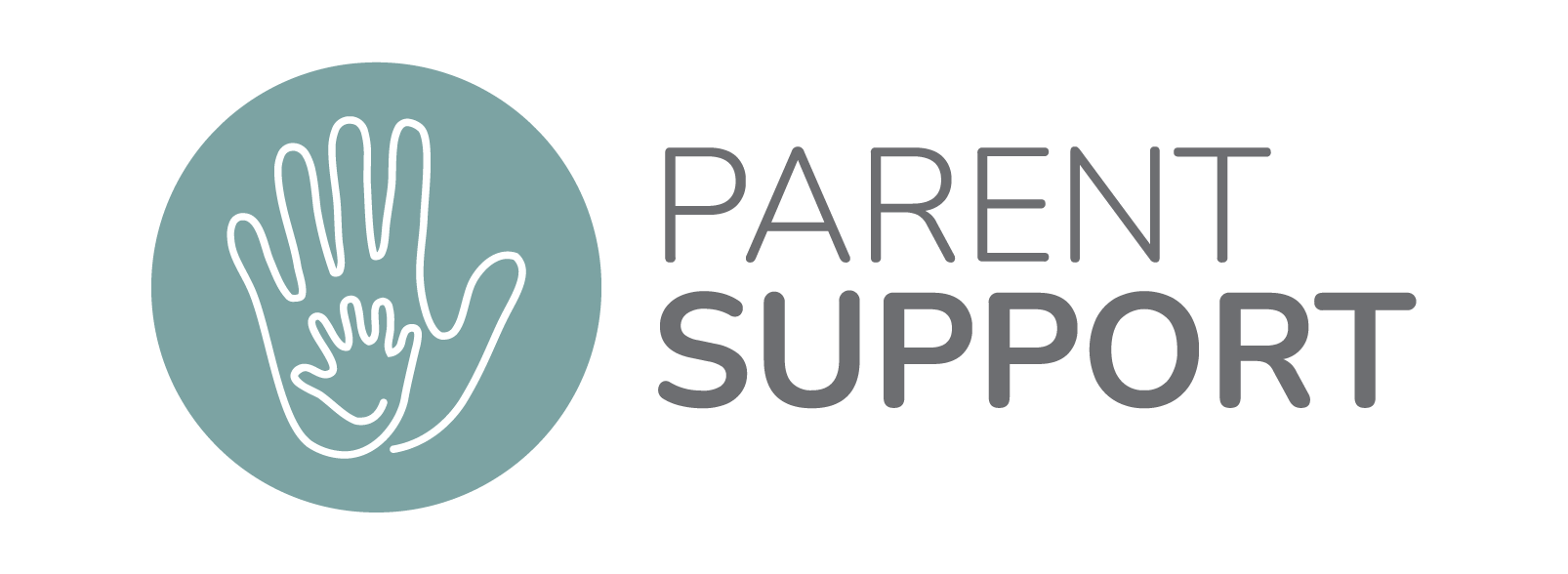
![HOW TO POTTY TRAIN YOUR CHILD [+ OVERCOME CHALLENGES]](https://images.squarespace-cdn.com/content/v1/5f726c553e90ae599436a3c4/1613944280107-JZA15VCS5MGC7FAFLUVS/HOW+TO+POTTY+TRAIN+YOUR+CHILD+%5B%2B+OVERCOME+CHALLENGES%5D)
